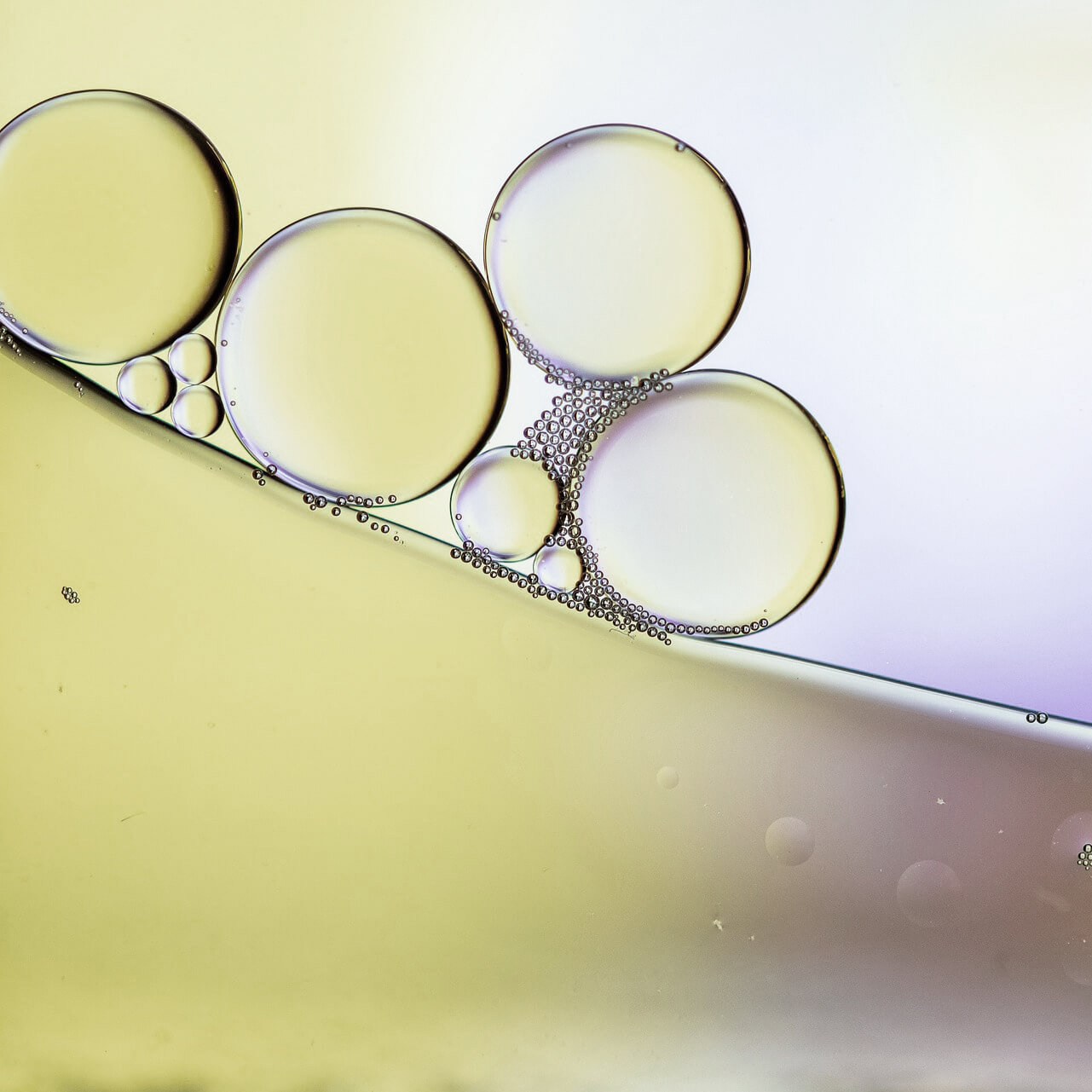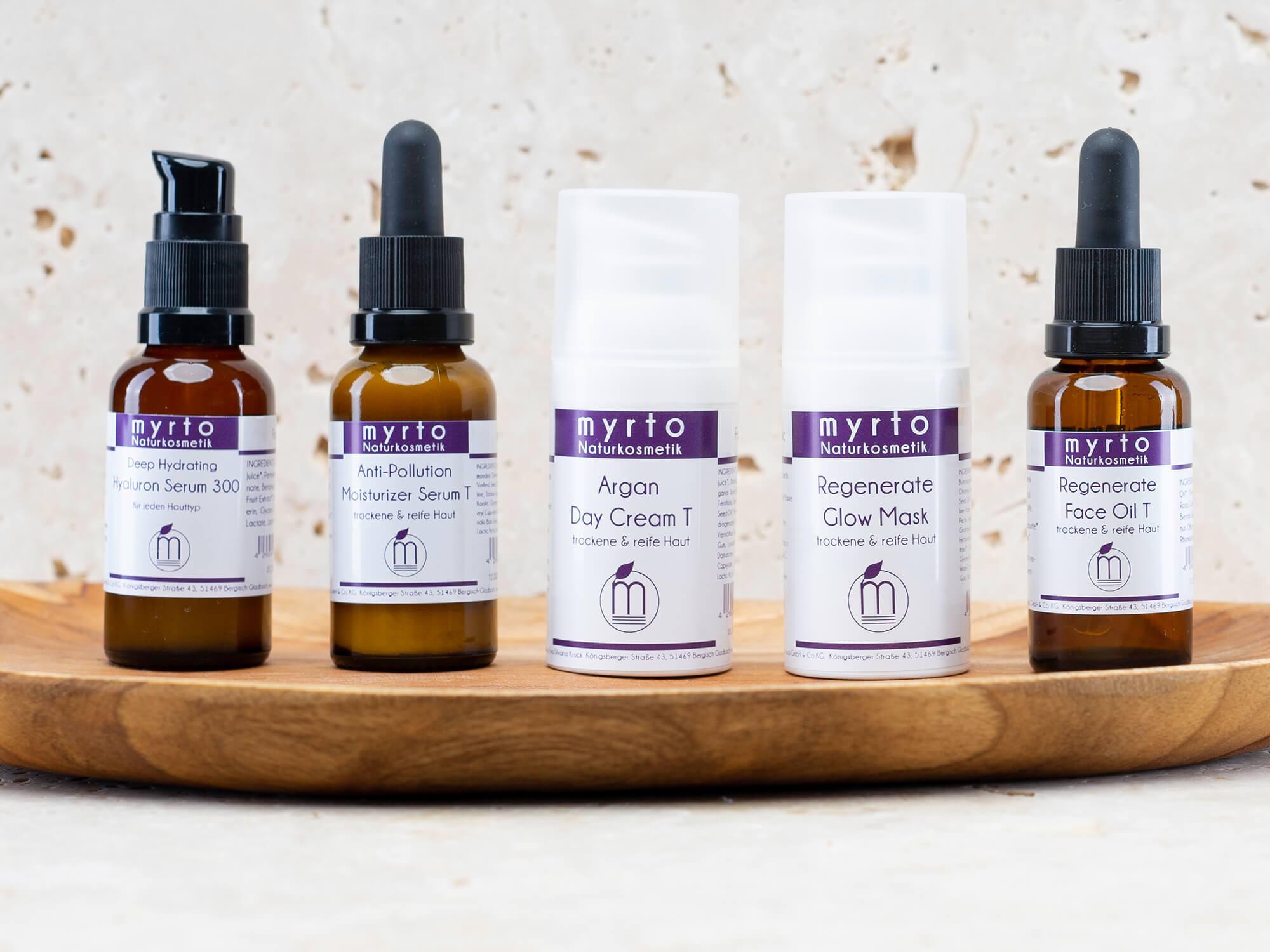Are alcohols bad for the skin?
If you take a close look at the ingredient lists (INCI) of skin care products, you will be amazed at how often alcohol is hidden in them. Facial toners, cleansers, moisturizers and anti-acne products for oily skin in particular often contain high concentrations of alcohol.
In this article, we explain why alcohol is used in skin care cosmetics, why alcohol is harmful in the long term in skin care, how you can recognize the different types of alcohol on the ingredients list of products and what skin care alternatives there are to alcohol. Finally, you will learn why fatty alcohols are by no means the "good alcohols". in cosmetics and what is the better choice for your skin instead.
Why is alcohol used in skin care?
Alcohol is used in skin care products because of its short-term effects. With its fat-dissolving power, alcohol is a solvent that can remove excess sebum from the surface of the skin. Alcohol initially ensures that the skin feels clean and light. Alcohol mattifies the complexion, which is particularly desirable for oily skin. In addition, alcohol allows the nourishing active ingredients of a cream to be absorbed into the skin more quickly (penetration enhancer), penetrating the protective barrier layer. Last but not least, alcohol inhibits the growth of microorganisms such as bacteria, viruses, yeasts or fungi in care products as well as on the skin. This is why alcohol is often used for preservation in traditional natural cosmetics.
What are the harmful effects of alcohol in skin care?
Despite its apparent short-term benefits, alcohol in skin care products damages the skin's functions in the long term, weakens the skin's own immune system and worsens many skin problems:
- Dry skin: Alcohol has a strong degreasing effect. Therefore, alcohol damages the lipid-containing skin protection by removing the skin's own fats. As a result, the skin loses moisture. This leads to chronic dryness, itchy, flaky skin, redness and a feeling of tightness.
- Weakened skin barrier: The skin barrier is essential for protection against external environmental influences such as pollutants and microorganisms. Alcohol weakens this protective barrier layer and makes the skin more susceptible to bacteria, pollutants, UV damage and sunburn.
- Impurities, inflammation, skin diseases: The degreasing effect of alcohol has an irritating effect on the skin. Alcohol can worsen the skin's appearance, cause irritation and promote inflammation. Alcohol worsens skin conditions such as neurodermatitis, rosacea, acne or inflammatory eczema such as dermatitis.
- Increased sebum production: Due to the strong degreasing effect of alcohol, the skin can subsequently react compensatory by producing even more sebum to protect itself from drying out. This in turn increases the skin's susceptibility to blemishes and spots.
- Formation of free radicals and premature skin aging: Alcohol promotes the formation of free radicals in the skin, which leads to oxidative stress. The unstable molecules of the free radicals accelerate the skin's aging process by breaking down collagen and damaging the skin structure. Wrinkles, fine lines and tired skin are the consequences.

What types of alcohol can you find in cosmetic products?
Alcohol (INCI: Alcohol), also known as ethanol, ethyl alcohol, drinking alcohol or wine spirit, is a slightly volatile liquid with a characteristic smell. Pure alcohol is primarily obtained by fermentation of sugar and starch-containing biomass by yeasts and bacteria.
Pure alcohol is subject to alcohol tax and is significantly more expensive than denatured alcohol, to which denaturants are added to make it undrinkable. In the cosmetics industry, denatured alcohol is therefore almost always used, which contains chemicals that are harmful to health as denaturants. Common denaturants are irritating to the skin, can cause allergies or even have carcinogenic and reprotoxic effects. Therefore, you should definitely avoid denatured alcohol in your skin care.
Typical INCI declarations of such "bad" alcohols are: Alcohol denat, SD Alcohol, Isopropanol, Isopropyl Alcohol, Propanol, Propyl Alcohol, Methanol, Benzyl Alcohol, Phenetyl Alcohol.
Pentylene Glycol - skin-friendly alternative to alcohol
While pure alcohol is used in traditional natural cosmetic skin care as an extraction agent for plant extracts and as a preservative, there are modern natural cosmetic alternatives that are significantly superior.
Instead of alcohol as a solvent, solvent-free CO2 plant extracts now enable particularly high-quality plant extracts that are extracted with pure carbonic acid.
Pentylene Glycol, which is extracted from sugar cane, is increasingly being used for the skin-care preservation of modern and low-irritation natural cosmetics. Pentylene Glycol is one of the dihydric alcohols that have 2 hydroxyl groups in their molecular structure. It has a preservative and moisturizing effect. Unlike other alcohols, Pentylene Glycol does not dry out the skin - even in higher doses. At the same time, Pentylene Glycol ensures that the active ingredients are absorbed as effectively as possible (penetration enhancers).
Fatty alcohols - the "good alcohols"?
Fatty alcohols are obtained from fatty acids by hydrogenation. According to their molecular structure, they are long-chain alcohols. Their ingredient names (INCI) include: cetyl alcohol, cetearyl alcohol, stearyl alcohol, lauryl alcohol, arachidyl alcohol, isocetyl alcohol, myristyl alcohol, behenyl alcohol, oleyl alcohol, decyl alcohol.
Fatty alcohols are usually referred to as "good alcohols" - in contrast to the "bad", denatured alcohols with a short-chain molecular structure.
Fatty alcohols form the basis of many creams and lotions. They are used as consistency agents, emulsifiers and softeners to give the skin a pleasant feel in creams, lotions and serums. Fatty alcohols are considered particularly suitable for dry, dehydrated or rough skin. But is that really true?
Why are fatty alcohols problematic?
While fatty alcohols are advertised as valuable skin care ingredients without harmful side effects, cosmetics manufacturers often fail to mention that fatty alcohols act as emulsifiers in a cream. Common use concentrations of up to 10% fatty alcohols in face creams, lotions, serums or conditioners have no benefits for skin health, but rather economic advantages for the cosmetics manufacturers.
Why are fatty alcohols used in conventional cosmetics?
Fatty alcohols are much cheaper to produce than high-quality cold-pressed plant oils such as argan, jojoba, hemp or grape seed oil. They contain only saturated fatty acids without any other bioactive ingredients. Therefore, fatty alcohols have a very long shelf life. Fatty alcohols are produced on a large industrial scale, are available in large quantities, are easy to process and are ideal for cost-effective mass production. They often consist of highly heated, refined palm oil. In contrast, cold-pressed, high-quality plant oils contain bioactive substances such as vitamins, secondary plant substances, unsaturated fatty acids and antioxidants, which have a significantly shorter shelf life and require gentle, time-consuming processing in complex manufacturing processes.
Fatty alcohols are therefore merely an inferior substitute for skin care products based on high-quality cold-pressed plant oils, which offer a far more intensive and long-lasting care effect.
Why are fatty alcohols harmful to skin health?
It is primarily the properties of fatty alcohols as emulsifiers that account for their long-term skin-weakening effect. One of the known side effects of skin-weakening emulsifiers is damage to the skin's natural fatty protective barrier. Long-term use of care products containing emulsifiers leads to the lipids being dissolved from the skin barrier and washed out. This causes the skin to dry out more and more. It also becomes more sensitive. Long-term, chronic skin irritations, skin diseases or allergic reactions are encouraged. In addition to premature skin aging, the skin becomes susceptible to blemishes, pimples and inflammation.
What alternative to fatty alcohols do we use at myrto in skin care?
We consistently avoid alcohol in myrto facial care products - as well as in our body and hair care. This also applies to fatty alcohols, which together with other emulsifiers form the basis of conventional cosmetics.
All myrto care products contain 0% alcohol and 0% fatty alcohols. We use pentylene glycol from sugar cane for a moisturizing and preservative effect.
In our myrto products, we place value on high-quality, natural oils such as argan oil, jojoba, grape seed oil and shea butter, which we use in high concentrations - instead of fatty alcohols. The basis of our skin care is bioactive plant oils with their vitamins, secondary plant substances, unsaturated fatty acids and antioxidants. The better the oil oils are, the better the product is for the skin. The difference is comparable to a salad, which you can either prepare with the finest olive oil - or with an inferior oil.


